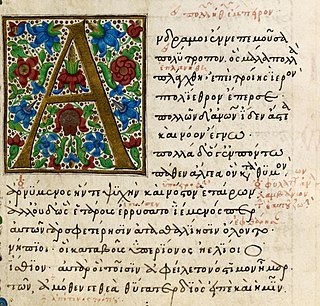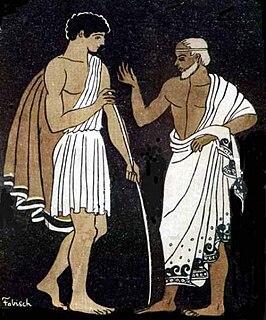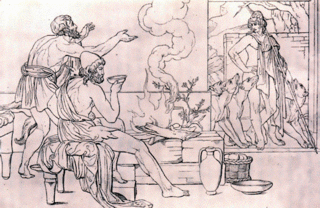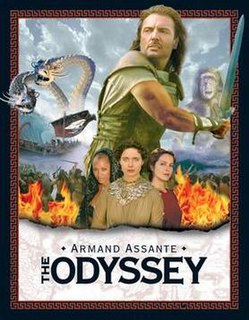This article is written like a personal reflection or opinion essay that states a Wikipedia editor's personal feelings about a topic.(October 2011) (Learn how and when to remove this template message) |

In Greek mythology, Eurycleia (Greek : ΕὐρύκλειαEurýkleia), or Euryclea ( /ˌjʊərɪˈkliːə/ ; also known as Antiphata (Ἀντιφάτη Antipháte) in other traditions), is the daughter of Ops and granddaughter of Peisenor, as well as the wet-nurse of Odysseus. As a girl she was bought by Laertes, Odysseus' father. He treated her as his wife, but she was never his consummated lover so as not to dishonor his real wife, Anticleia. She later nursed Telemachus, Odysseus' son.

Greek mythology is the body of myths originally told by the ancient Greeks. These stories concern the origin and the nature of the world, the lives and activities of deities, heroes, and mythological creatures, and the origins and significance of the ancient Greeks' own cult and ritual practices. Modern scholars study the myths in an attempt to shed light on the religious and political institutions of ancient Greece and its civilization, and to gain understanding of the nature of myth-making itself.

Greek is an independent branch of the Indo-European family of languages, native to Greece, Cyprus and other parts of the Eastern Mediterranean and the Black Sea. It has the longest documented history of any living Indo-European language, spanning more than 3000 years of written records. Its writing system has been the Greek alphabet for the major part of its history; other systems, such as Linear B and the Cypriot syllabary, were used previously. The alphabet arose from the Phoenician script and was in turn the basis of the Latin, Cyrillic, Armenian, Coptic, Gothic, and many other writing systems.
Contents
Eurycleia's name means "broad fame," while Anticleia means "anti-fame." The tension between the meanings of Eurycleia's name and Anticleia's name reflects the tension between the two pillars of Odysseus' life.[ citation needed ] He was born to Anticleia, a noble woman, but was nursed (and essentially raised) by Eurycleia, a lower-class maid. Odysseus' fame comes from his role as a noble hero paralleled to his role as an anonymous beggar. His heroism is essential for capturing Troy; his skills as an orator and schemer as well as his strength and skills on the battlefield are instrumental in the success of the Greeks. However, he takes on the role of a beggar not once, but twice. He first appears as a beggar to sneak into Troy and kill unsuspecting Trojan soldiers, and again when he returns home to Ithaca and plans to kill all of Penelope's suitors. In many ways, his role as a beggar, especially when he returns to Ithaca is far more meaningful. His re-entry into his own home after twenty years is arguably the most important moment of his life, perhaps suggesting that his role as a beggar — and his connection with Eurycleia — is what is most important to him.
Eurycleia is the only person to recognize him without him first revealing himself (as he did to Telemachus) after he returns home from the Trojan War. After he enters his own house as a guest of Penelope disguised as a beggar, Eurycleia bathes him and recognizes him by a scar just above his knee, which he got from a boar while hunting with his grandfather Autolycus. [1]

In Greek mythology, the Trojan War was waged against the city of Troy by the Achaeans (Greeks) after Paris of Troy took Helen from her husband Menelaus, king of Sparta. The war is one of the most important events in Greek mythology and has been narrated through many works of Greek literature, most notably Homer's Iliad. The core of the Iliad describes a period of four days and two nights in the tenth year of the decade-long siege of Troy; the Odyssey describes the journey home of Odysseus, one of the war's heroes. Other parts of the war are described in a cycle of epic poems, which have survived through fragments. Episodes from the war provided material for Greek tragedy and other works of Greek literature, and for Roman poets including Virgil and Ovid.

In Homer's Odyssey, Penelope is the wife of Odysseus, who is known for her fidelity to Odysseus while he was absent, despite having many suitors. Her name has therefore been traditionally associated with marital fidelity.
In Greek mythology, Autolycus was a successful robber who had even the power of metamorphosing both the stolen goods and himself. He had his residence on Mount Parnassus and was renowned among men for his cunning and oaths.
Odysseus stops her from telling Penelope or anyone else (except Telemachus, who already knows) in the house of his true identity: Gripping her by the throat he says, "Nanny, d'ye want to destroy me?...not another soul must know. Or...I will not spare even you my nurse, when I kill the other women in this house." [2]
Eurycleia also informs Odysseus which of his servant girls had been unfaithful to Penelope during his absence, conspiring with Penelope's suitors and becoming their lovers. Among them was Melantho. His son Telemachus hangs the twelve that Eurycleia identifies.
Melantho is one of the minor characters in the Odyssey. Described as having a "sharp tongue", she is sister to Melanthios, a goatherd in Ithaca, and the daughter of Dolios. She is among the favorite maids of Penelope, treated like a daughter by her, having been given trinkets and other small gifts.

Telemachus is a figure in Greek mythology, the son of Odysseus and Penelope, and a central character in Homer's Odyssey. The first four books of the Odyssey focus on Telemachus's journeys in search of news about his father, who has yet to return home from the Trojan War, and are traditionally given the title the Telemachy.
Later, Eurycleia informs Penelope that Odysseus has returned, but Penelope does not believe the maid. Penelope then tests Odysseus to prove that he is indeed her husband and asks him to move the bed Odysseus built in their marriage-chamber; Odysseus tells Penelope that this is not possible, as one of the legs of the bed is built into a live olive tree, a secret that only Penelope and Odysseus would know. She finally accepts that her husband has returned.
In addition, it was Eurycleia who gives provisions and supplies to Telemachus from the storehouse before he leaves for Pylos to seek news about Odysseus. She takes an oath not to tell Penelope he had left until 12 days had passed; Telemachus did not want his mother to be any more worried than she already was.







